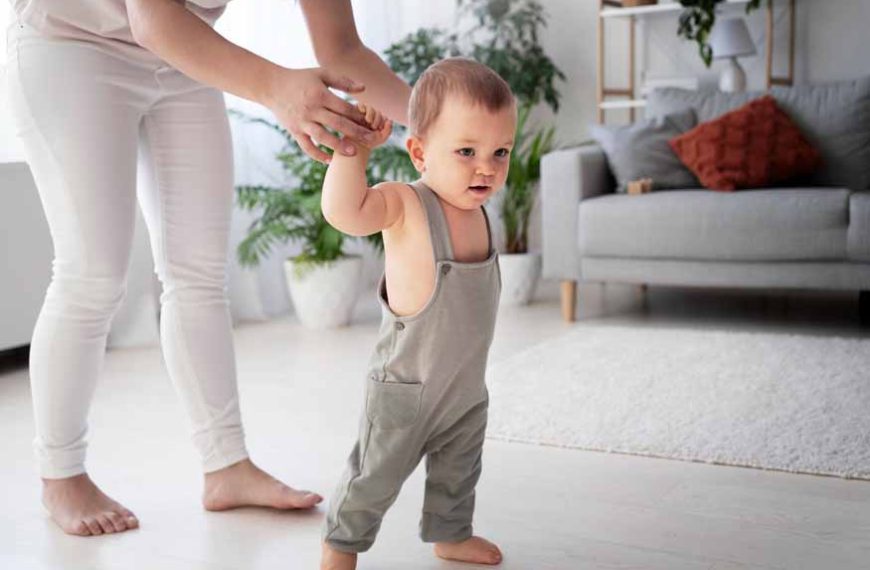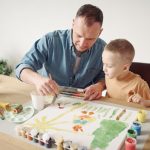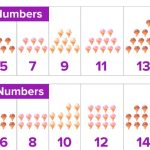“Pulling up and standing are fun, exciting developmental milestones for babies and parents alike. These important skills help babies develop their arm and leg muscles and give them a whole new, upright view of the world. Plus, standing is the prelude to cruising and walking, which means your baby will soon become a lot more mobile.”
Vincent Ianneli, Sarah Rahal, VerywellFamily
Oh, the wonder and delight of watching your baby grow! As parents, we eagerly anticipate each milestone – from their first smile to their first word. One significant developmental marker that we cannot wait to witness is when our little one stands on their own and takes those first few wobbly steps. So, what is the age when babies stand alone? And how can we encourage them to walk? Let’s explore the age when babies stand-alone, the baby walking stages, and tips to support their progress.
It’s important to remember that every baby is unique, and they’ll reach milestones at different times. Obviously, there is no straight answer to the question – “What is the age when babies stand alone?” While some babies might stand without support as early as 7-8 months, others might take until their first birthday or even longer. On average, though, most babies begin pulling themselves up to a standing position between 9 and 12 months. It’s during this period that they start to gain the confidence and balance necessary to stand without support. This is a complete guide for parents on your little ones first footsteps.
Did you ever wonder when do babies stand without support?
6 Stages of Baby Walking
Babies don’t just suddenly start walking one day; there’s a whole process involved. Here are the baby walking stages you can expect to see to understand when do babies stand:
- Sitting independently
- Crawling
- Pulling up
- Cruising
- Standing without support
- First steps
Usually, around 6 months of age, babies begin to sit up on their own. This stage is crucial for developing the core muscles and balance needed for standing and walking.
This stage typically occurs between 6 and 10 months, although some babies may skip it entirely. Crawling helps babies develop strength in their arms and legs, which will later aid them in standing and walking.
Did you know that when a baby stands without support it is creating a key development in the brain?
Between 9 and 12 months, generally a baby stands without support. Further, babies start using furniture or other objects to pull themselves up into a standing position. This stage is vital for building leg muscles and improving balance.
Babies will begin to “cruise” or shuffle along furniture while holding onto it for support. This usually occurs around 9-12 months, helping them develop the coordination necessary for walking unassisted.
Finally, babies will gain the confidence and balance to stand on their own without holding onto anything. This milestone typically happens between 10 and 14 months.
The moment we’ve all been waiting for – when babies take their first unassisted steps. This can happen anywhere between 9 and 17 months, although most babies start walking around on their first birthday.
8 Successful Strategies to Encourage Babies to Walk
So, how can we as parents or caregivers encourage babies to walk? LIke we mentioned above, there is no specific age when babies stand alone. Here are some helpful tips to support your baby’s journey to standing without support and walking:
- Create a safe environment
- Encourage tummy time
- Provide support
- Use toys as motivation
- Celebrate achievements
- Be patient
- Encourage barefoot exploration
- Limit the use of baby gear
Make sure your home is baby-proofed, removing potential hazards and providing plenty of open space for your baby to explore. Place padding or soft rugs on the floor to cushion any potential falls.
Tummy time helps babies develop the strength and coordination needed for crawling, standing, and walking. Start with a few minutes each day and gradually increase the duration as your baby becomes more comfortable.
When your baby begins pulling up, offer your hands or fingers for them to hold onto as they practise standing. This support will help them gain confidence in their balance and eventually stand without assistance.
Place toys or objects just out of your baby’s reach, encouraging them to stand up and cruise along furniture to get to them. You can also use toys that promote standing and walking, such as push or pull toys.
Babies thrive on positive reinforcement. Be sure to praise and applaud their efforts as they progress through each stage of standing and walking. Celebrate their achievements, no matter how small, to boost their confidence and motivate them to keep trying.
Remember that each baby develops at their own pace. Avoid comparing your child to others or pushing them too hard. Be patient and let them reach milestones in their own time.
Allowing your baby to explore their surroundings barefoot can help improve balance and coordination. Barefoot babies can better feel the ground beneath them and learn to grip surfaces with their toes.
While baby walkers and jumpers can provide temporary entertainment, they may not contribute positively to your baby’s walking development. In fact, excessive use of these devices might delay the process. Instead, give your baby plenty of floor time and opportunities to practise standing and walking with your support.
There you go, these are the ways in which you can see your baby standing without support.
Conclusion
As exciting as it may be to see your baby standing without support and taking their first steps, it’s crucial to remember that every child’s development is unique. The age when babies stand alone and begin walking varies greatly, so try not to worry if your little one isn’t reaching milestones at the same time as others. In this article, we hope to have answered your question ‘when do babies stand?’
To encourage your baby through the various walking stages, provide a safe environment, offer support, motivate with toys, and celebrate their achievements to encourage baby standing alone. With patience, love, and encouragement, your baby will soon be taking confident strides into the world of walking.
Remember, the journey to walking is filled with wobbles, stumbles, and falls – all of which are a natural part of the learning process. With a baby standing alone, embrace these moments and cherish the memories, for they are fleeting, and before you know it, your little one will be running, jumping, and exploring the world on their own two feet. In this article, we hope to have answered your question ‘when do babies walk without support?’
At Eurokids, we understand the importance of physical activities for children. With “a child first” ideology, we focus on a child’s holistic development. Our curriculum keeps the innocent and beautiful mind of a child at the heart of everything we do. Mindful learning, spaced learning and blended learning are the 3 pillars of our curriculum which focuses on developing a good Mind, Fit Body and a Beautiful Soul. Three domains developed are Cognitive: mental skills (knowledge), Affective: growth in feelings or emotional areas (attitude or self) Psychomotor: physical skills.
For informative and accurate articles on all things related to your new born-toddler’s development, growth, health and nutrition, follow EuroKids Blogs and do check out our nationally recognized preschools – EuroKids for the first step in your kid’s educational journey!


















